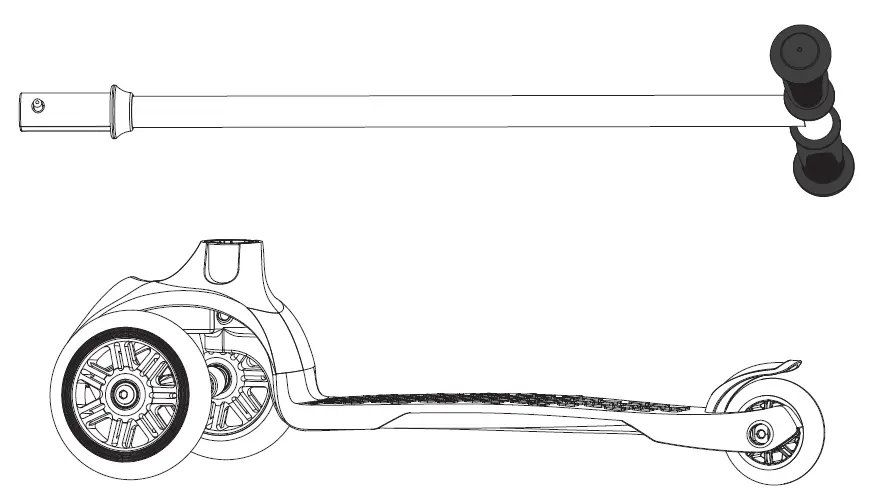Razor Jr. T3 Scooter
Parts

Installation



SAFETY PRECAUTIONS during operation and maintenance.Parents/adult supervisors read this page first.PARENTAL AND ADULT RESPONSIBILITY AND SUPERVISION ARE NECESSARYBecause scooters can be hazardous — and not every product is appropriate for every age or size of child — different age recommendations are found within this category of product which are intended to reflect the nature of the hazards and the expected mental or physical ability, or both, of a child to cope with the hazards. Parents and supervising adults need to select riding products appropriate for the age of the child and take care to prevent children who may be too immature or inexperienced for a product’s characteristics to endanger themselves around it.
PARENTS/SUPERVISING ADULTS MUST ASSEMBLE AND INSPECT THIS PRODUCT, AND MUST TEACH CHILDREN HOW TO SAFELY RIDE THIS SCOOTER. If the rider fails to use common sense and heed these warnings, there is an increased risk of damage, serious injury or possibly death.
Age and Weight Limits
- Not for children under age 3.
- Maximum rider weight 22 kg (48 lb).
- Rider weight does not necessarily mean a child’s size is appropriate to fit or maintain control of the scooter.
- A parent’s decision to allow his or her child to ride this product should be based on the child’s maturity, skill and ability to follow rules.Razor Jr. products are intended to allow younger children to learn and to enjoy their early experiences using ride-on toys. Studies suggest that children at age 3 have the coordination required to use a steering wheel or handlebar and can use a 3-wheeled scooter, but may not have developed the balance required to operate 2-wheeled scooters. This ability is expected to develop with time and experience to where, depending on experience, most children by the age of 5 have the balance and coordination to use 2-wheeled scooters. Adult supervision is required as children learn and grow because children do not understand the risks of riding in areas with cars and are at a very high risk of falling and injuring themselves.
USE SCOOTERS AT YOUR OWN RISK AND USE COMMON SENSE.
WARNING. To avoid serious injury:
- Protective equipment should be worn. Not to be used in traffic. 22 kg max.
- Do not touch the brake after using, it will be hot.
- Adult supervision of young children is important.
- Do not allow children under age three (3) to use the scooter.
- Always wear safety equipment, such as helmet, knee pads and elbow pads.
- Always wear a helmet when riding your scooter and keep the chinstrap securely buckled.
- Always wear closed toe shoes.
- Avoid sharp bumps, drainage grates, and sudden surface changes, as scooter may suddenly stop.
- Avoid streets and surfaces with water, mud, ice, sand, gravel, dirt, leaves and other debris. Wet weather impairs traction, stopping, and visibility.
- Do not ride at night or when visibility is impaired.
- Avoid excessive speed associated with downhill rides.
- Obey all local traffic and scootering laws and regulations.
- Watch out for pedestrians.
ACCEPTABLE RIDING PRACTICES AND CONDITIONS
- Direct parental supervision is required at all times. Young children are learning basic riding abilities and need close attention.
- Parents and carers should ensure that children are properly instructed in the use of this product.
- Scooters are meant to be used only in controlled environments, free of potential traffic hazards and not on public streets.
- Do not allow your child to ride a scooter in any areas where vehicle traffic is present. Watch surroundings for pedestrians, bike, skateboard, scooter and other riders. Use in areas free from hazards, such as poles, hydrants, and parked cars.
- Child must maintain a hold on the handlebars at all times. Never allow more than one child at a time to ride a scooter. Never use near steps, sloped driveways, hills, roadways, alleys or swimming pool areas.
- Wet weather impairs traction, stopping and visibility.
- Never use near streets, swimming pools, hills, or steps.
- Like any other moving product, riding this product can be a dangerous activity and may result in injury even when used with proper safety precautions.
Failure to heed product warnings, or to exercise caution, increases risk of injury!
Where and How to Ride
- Stop by pushing on brake with foot.
- To steer lean in the direction you wish to travel.
- Learn to fall (by rolling if possible) without the product.
- Learn with a friend or parent to help.
- Check local laws regarding where and how you may use your product.WARNING:CHECK LOCAL LAWS REGARDING SCOOTER USE. Check local laws and regulations to see where and how you may use your scooter legally. In many regions scooter riders may be required BY LAW to wear a helmet. Check local laws and regulations regarding laws governing helmet use and scooter operation in your area.WARNING:ALWAYS INSPECT SCOOTER PRIOR TO RIDING. Properly inspecting and maintaining your scooter can reduce the risk of injury. Always inspect your scooter before riding and regularly maintain it. Replace worn or damaged parts, such as grips, handlebars, handlebar endcaps or worn wheels.
Maintenance
- Check that the steering system is correctly adjusted and that all connection components are firmly secured and not broken.
- Check brake for proper function. When you push on the brake with your foot, brake should provide positive braking action.
- Under normal circumstances and conditions, the wheels are maintenance free.
- Regularly check that the various screwed parts are tight.
- No modifications can be made that can impair safety.
- Use only authorized Razor replacement parts.
Printed in China for Razor USA LLC.Copyright ©2003-2015 Razor USA LLC. All rights reserved. Razor® and the Razor logo design are among the registered trademarks of Razor USA LLC and/or its affiliated companies in the United States and/or select foreign countries. t3™ is a trademark of Razor USA LLC.
[xyz-ips snippet=”download-snippet”]

